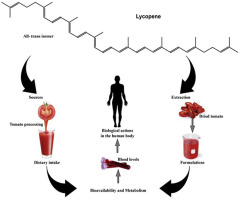LWT - Food Science and Technology ( IF 6 ) Pub Date : 2020-03-29 , DOI: 10.1016/j.lwt.2020.109323 Mélanie Caseiro , Andreia Ascenso , Ana Costa , Jack Creagh-Flynn , Melissa Johnson , Sandra Simões

|
The dietary intake of lycopene is recommended, demonstrated by the health-promoting properties important through all phases of human life, however it is currently not considered an essential nutrient. Evidence suggests a growing interest is observed in lycopene intake from the present general consciousness of the food we consume and food ingredient based cosmeceuticals are increasingly connected with a positive impact on human health and wellness. Lycopene is a natural carotenoid pigment with a variation of intake depending on the population investigated. Although lycopene present in the human body is predominantly derived from tomato and tomato processed foods, this red-coloured compound is also found in other fruits and vegetables. As a result of the low bioavailability of lycopene, its circulating levels are more suitable as prognostic data for health outcomes than its dietary intake values. Lycopene has the potential responsibility for human health in different ways. For example, it can protect lipids, proteins and DNA from oxidative damage; stimulate the modulation of cell growth and the expression of connexin 43, IGF-1 and/or IGF binding protein blood levels as well as intermediate in immune and inflammatory processes. A beneficial or prejudicial cellular response by lycopene will depend on its antioxidant or prooxidant properties respectively, depending on the cellular and extracellular environment. Primarily, carotenoids and metabolites at low doses may present the beneficial effects described above, however the equivalent is not observed at high doses corresponding to harmful prooxidant effects.
中文翻译:

番茄红素对人类健康的影响
推荐从饮食中摄取番茄红素,其在整个生命的各个阶段都具有促进健康的重要特性,但目前尚不被认为是必需的营养素。有证据表明,从我们目前所食用的食物的一般意识中,人们对番茄红素的摄入越来越感兴趣,而以食品成分为基础的药妆品对人类健康的影响越来越大。番茄红素是一种天然的类胡萝卜素色素,其摄入量根据所研究的人群而有所不同。尽管人体中存在的番茄红素主要来自番茄和番茄加工食品,但这种红色化合物也存在于其他水果和蔬菜中。由于番茄红素的生物利用度低,它的循环水平比饮食摄入量更适合作为健康结果的预后数据。番茄红素以不同方式对人类健康负有潜在责任。例如,它可以保护脂质,蛋白质和DNA免受氧化损伤;刺激细胞生长的调节和连接蛋白43,IGF-1和/或IGF结合蛋白血液水平以及免疫和炎性过程中间产物的表达。番茄红素对细胞的有益或偏见反应将分别取决于其抗氧化剂或促氧化剂特性,这取决于细胞和细胞外环境。首先,低剂量的类胡萝卜素和代谢产物可能具有上述有益作用,但是在高剂量下却没有观察到等效的作用,这与有害的促氧化剂作用相对应。



























 京公网安备 11010802027423号
京公网安备 11010802027423号